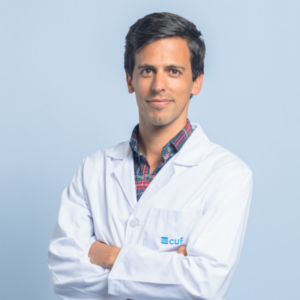We invited Dr Miguel Reis e Silva, in his quality of a contributor to the Portuguese National Programme for the Promotion of the Physical Activity of the Directorate-General for Health, to share his perspective on Sport and Exercise Medicine (SEM) in his home country, Portugal.

Tell us more about yourself.
I’m a Portuguese Medical Doctor, a specialist in Sports Medicine and Physical Medicine and Rehabilitation. I’m also a former national team athlete in Trail Running and Orienteering.
I dedicate myself to the musculoskeletal system in two different ways:
- by performing minimally invasive interventions guided by ultrasound (diagnostic and interventional) and fluoroscopy (spine). I apply this kind of interventions in the context of chronic pain in three different Pain Units in Lisbon and in the context of sports at the Sport Lisboa e Benfica Medical Department.
- by using biomechanical analysis in the context of neurological rehabilitation (at the Movement Analysis Laboratory of Centro de Medicina de Reabilitação de Alcoitão) and in the context of injury prevention and treatment (at my own practice, the Myalgia Clinic).


What is the path to becoming a sport and exercise physician in Portugal, and what are the main hurdles on this path?
Since 2013, there has been a 4-year long structured, full-time residency in Sports Medicine for physicians that completed the 6 years of medical school and one general residency year. The residents with the best grades on the final exam can choose first which specialities they want to pursue. The ones with the worst grades must take the leftovers.
However, it is still possible to obtain the specialisation by taking an annual exam organised by the Sports Medicine Medical College, in which the candidate should pass a practical oral exam, a written theoretical exam and provide proof of adequate experience in all the areas contained in the official residency curriculum, namely Sports Medicine, Cardiology, Pneumology, Exercise Physiology, Orthopaedics, Physical Medicine and Rehabilitation, Pathology and Toxicology, Psychology and Nutrition.
How developed is collaborative work in SEM in Portugal?
Football (soccer) is the main sport in Portugal, so we have top-level SEM teams concentrated around the biggest football clubs. They all have full teams of MDs, physiotherapists, physiologists, nutritionists, and psychologists, even in the younger classes, and they work with high standards. Many of these teams end up working in foreign clubs.
In other sports federations and amateur sports, the financial limitations are always present, so the teams usually depend on how many SEM professionals are interested in the sport and willing to cooperate with its development, often without any financial compensation.
Are exercise physiologists/scientists integrated into your healthcare system, and does health insurance cover their services?
Unfortunately, exercise physiologists are not usually integrated into our healthcare. There have been many plans and movements to implement this introduction, but none of them has had any success. Furthermore, health insurance does not cover their services.
The Portuguese healthcare system has been, for long, one of the best in the world; however, in the last years, there has been successive disinvestment in this area with a massive migration of health professionals from the public to the private sector. Consequently, basic healthcare services in the public services are starting to fail, so I do not anticipate the introduction of physiologists in the near future.
What is done in Portugal to promote SEM among students and young professionals regarding research and clinical opportunities?
The Medical Departments of the main football clubs and the Portuguese Football Federation organises medical courses every year and welcome medical students and residents for internships.
The Portuguese Society of Sports Medicine organises the annual postgraduate training in Sports Medicine, the National Congress of Sports Medicine, and many short courses on diverse SEM themes.
Finally, if you were Harry Potter, what would you change to SEM in Portugal?
The main SEM teams in Portugal are focused on high-performance sport, in line with the organisation of the sport itself in the country. This reflects the paradox that this country creates/produces many international athletes like Cristiano Ronaldo, while we still have one of the most sedentary young populations in Europe.
If I could, I would turn around the pyramid and start building a sportive structure from the basis, with sport facilitator environments and accessible SEM professionals for everyone. This investment is widely known to be cost-efficient; the problem is that the return is in the long-term, and for that, one needs long-term planning in politics.
If you have a population-based sports environment, high-level sports surge without any effort: higher levels of interest and more public lead to more investment and a wider pool of amateur athletes leads to more talented top-athletes.